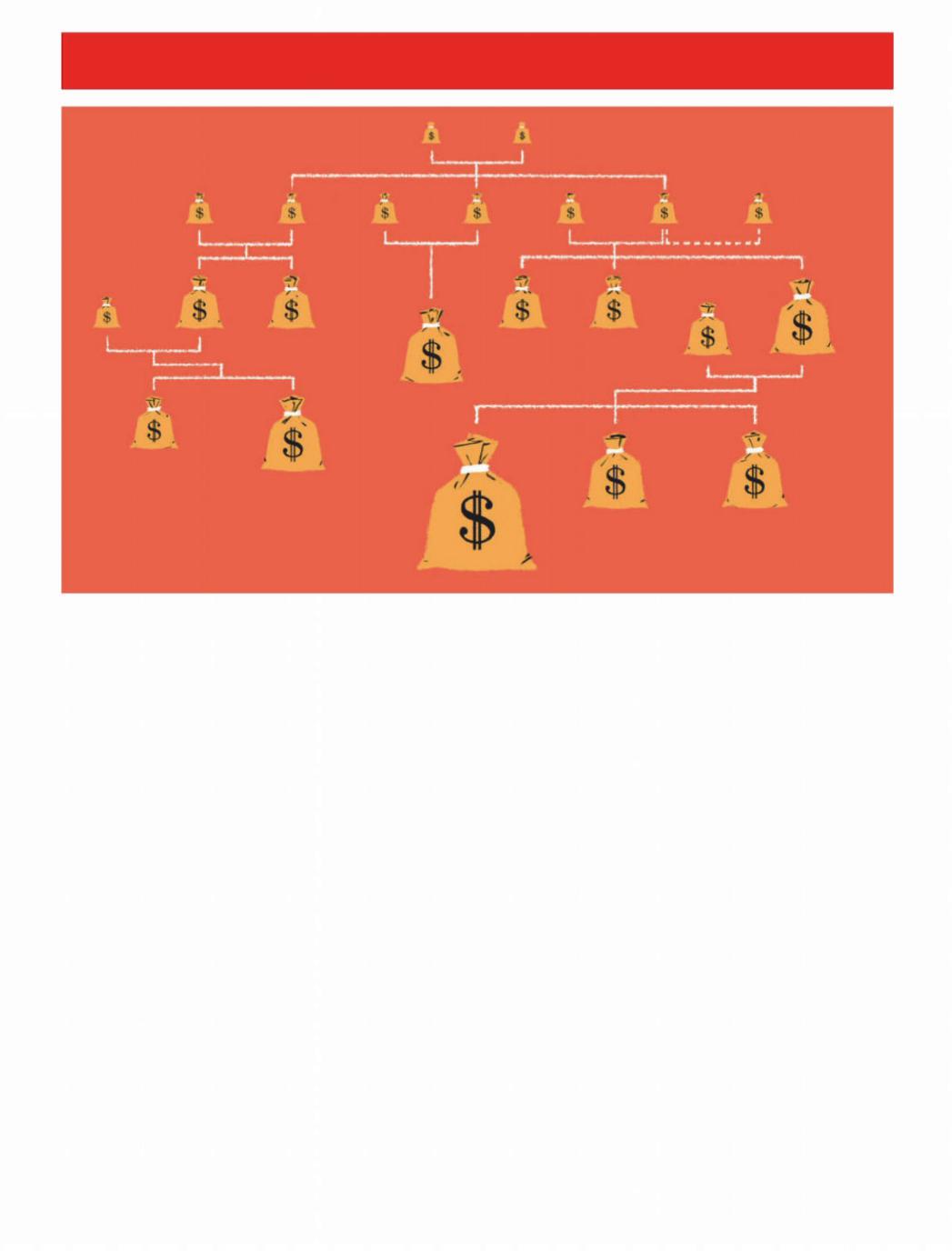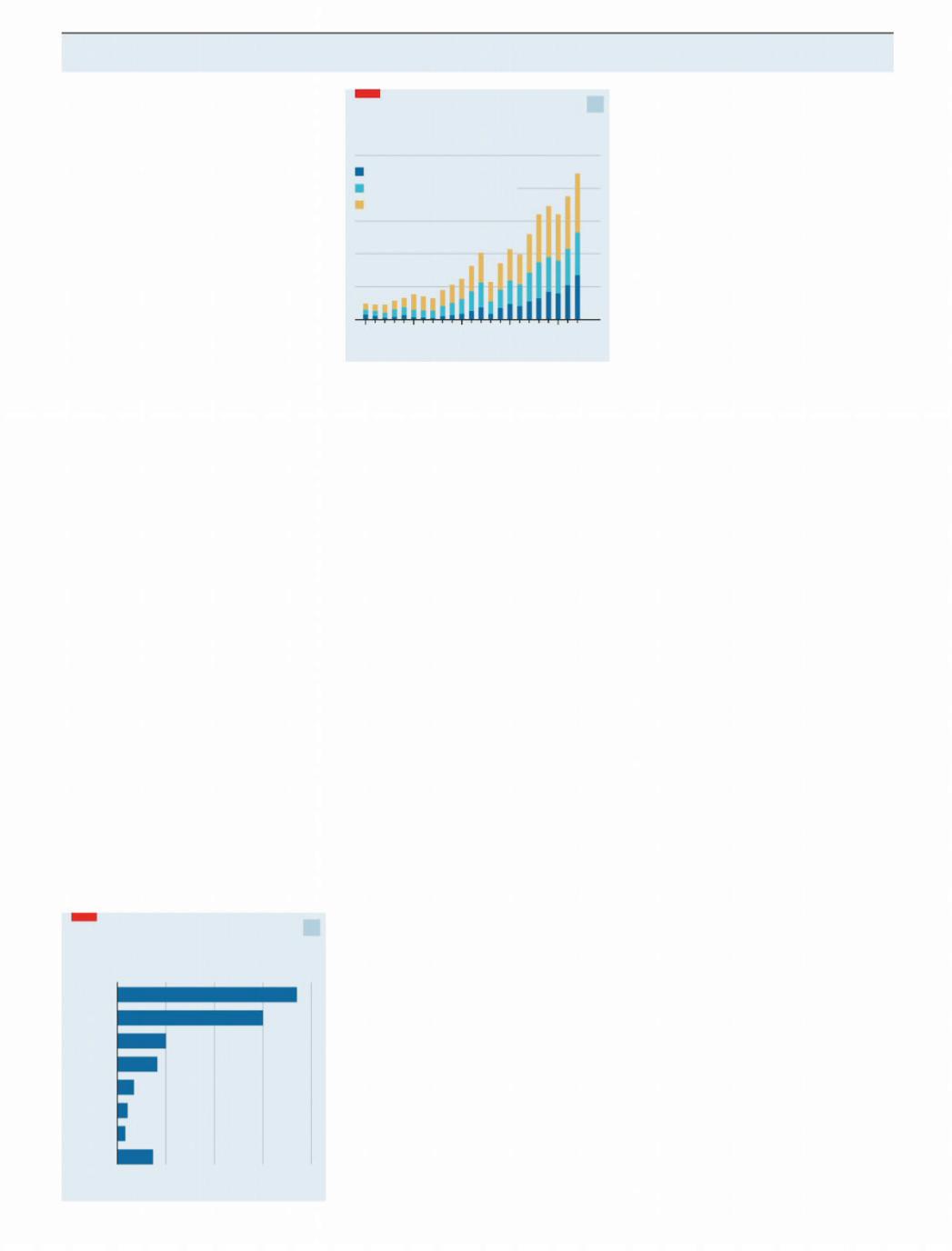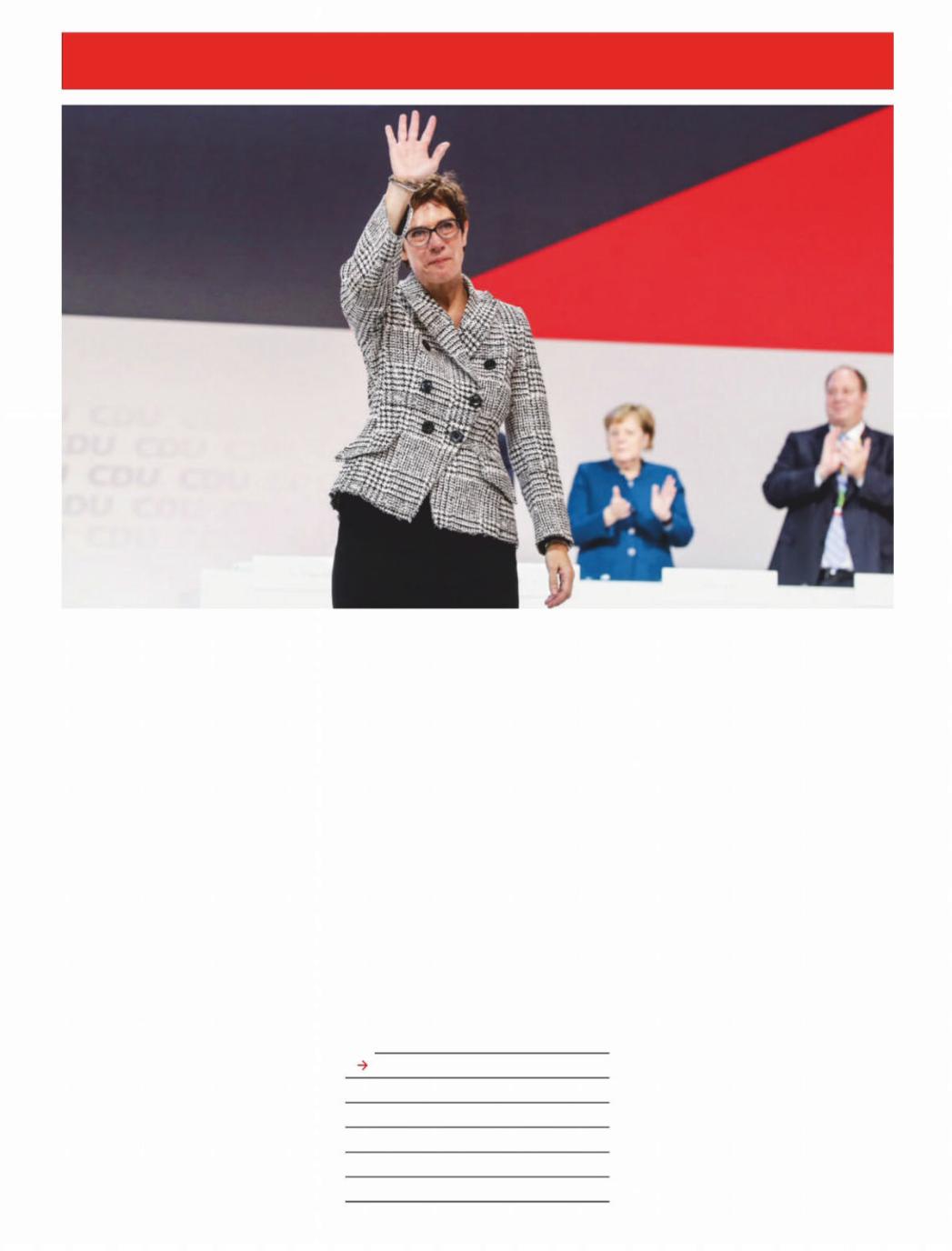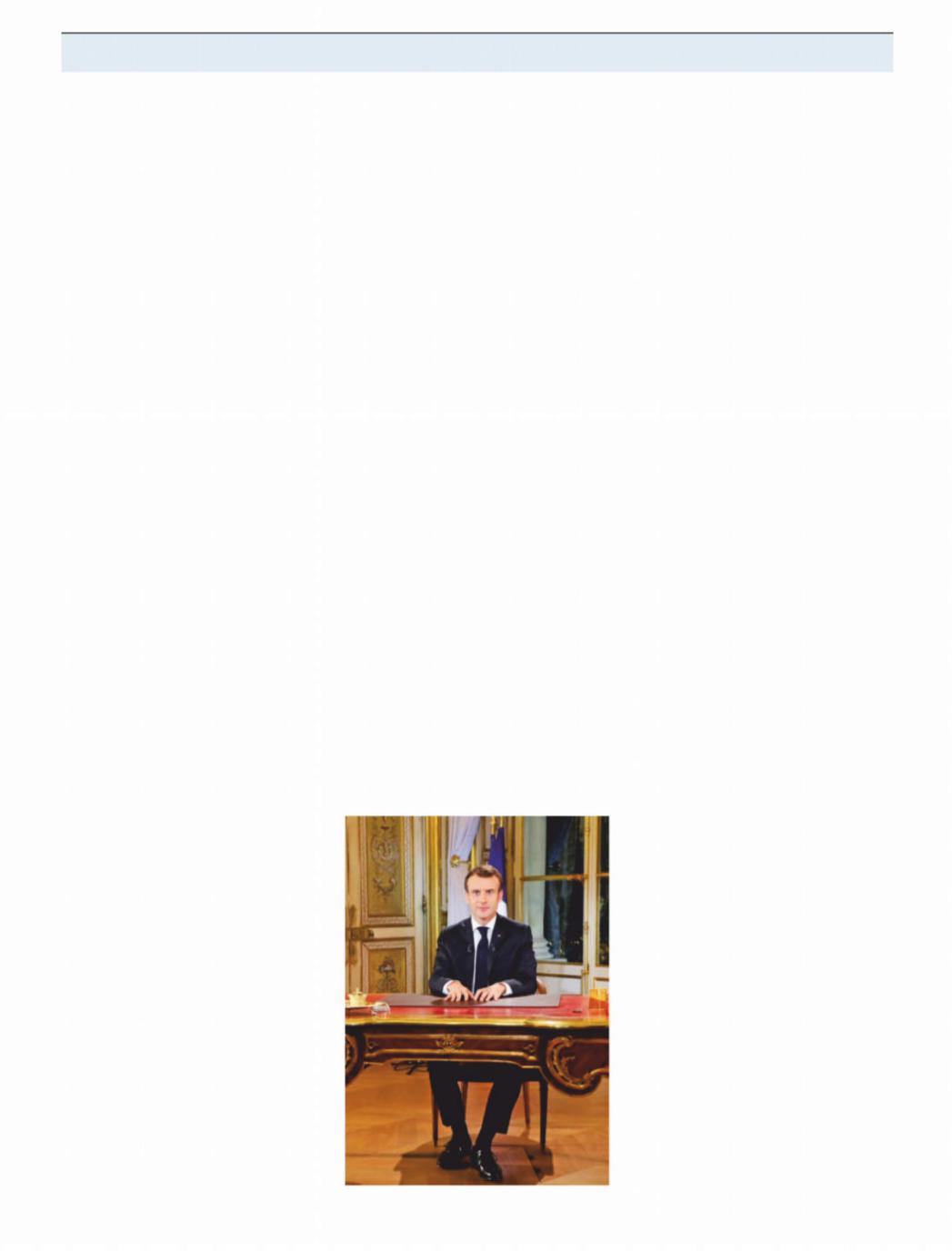
The_Economist_15_12_2018_watermark
.pdf
vk.com/id446425943 |
|
Executive focus |
21 |
The World Health Organization (WHO) seeks a
Comptroller & Director of Finance
(Vacancy reference: 1806191)
In support of the Organization’s mandate and mission, the Comptroller & Director of Finance, as the authority on financial matters in WHO, will drive best practice in financial management with integrity and transparency, providing strategic and effective support for financial administration across WHO for all sources of funds, including relevant financial reporting at all levels, both internally and externally.
More specifically, the Comptroller & Director of Finance will:
•Manage: WHO’s financial reserves and liquidity within appropriate investment risk parameters, and ensuring at all times, adequacy of WHO cash-flow and overall financial integrity.
•Ensure: Accounting, statutory financial reporting, treasury, income recording, pension and health insurance services for the Organization and its hosted entities in accordance with the Organization’s financial control framework.
•Advise: Senior Management, regional offices and hosted entities on accounting, treasury and reserves management, including WHO’s health insurance, as well as strategic financial management and policy issues.
•Liaise: With representatives of Member States, other UN Organizations, and other partners on financial matters.
Salary: This position is classified at the “D2” level in the United Nations common system. WHO offers an attractive expatriate package including health insurance, financial support for schooling of children and a relocation package. For more information and to apply online please go to:
http://www.who.int/careers/en/
Deadline for applications is 20 January 2019.
“Promote health, keep the world safe, serve the vulnerable”
Dr Tedros Adhanom Ghebreyesus Director-General

vk.com/id446425943
22 |
Briefing Family offices |
The Economist December 15th 2018 |
|
Super-help for the super-rich
D U B A I
Billionaires’ in-house investment teams are joining the ranks of the world’s financial titans
Hussein sayed, a local anchor with cnbc, a tv network, beams from the stage as he welcomes participants to a conference on family o ces (fos) in Dubai. Among those present are billionaires and their o spring, advisers and money managers, and a smattering of investmentminded blue-bloods, including Prince Michael of Yugoslavia. “We think there may be over $2trn represented in this room,” announces Mr Sayed, “though of course
there’s no way of knowing.”
Now an essential part of every self-re- specting billionaire’s stable, fos are booming. Their roles include managing families’ wealth, administering their assets and often other services, from the mundane (paying bills) to the knotty (succession-plan- ning). The biggest have become deal powerhouses, capable of competing with global banks and private-equity firms on big transactions. But they are also, by definition, private—and therefore little understood. “We’re the most important part of the investment landscape most people have never heard of,” says one executive.
The fo has its roots in the organisations that oversaw the fortunes of America’s 19th-century robber barons, such as J.P. Morgan and John D. Rockefeller. Several hundred have been in operation for at least three generations. Some now serve extended families with hundreds of members— over 600 in the case of France’s Mulliez clan, owners of the Auchan hypermarket chain. Most, however, are recent creations. Of the 311family o ces that took part in the survey for the latest annual Global Family O ce Report by ubs and Campden Wealth, published in September, more than twothirds were established after 2000 (see chart 1on next page) and over half are serving the first generation of wealth.
Keep it among kin
This spurt reflects an acceleration in the number of billionaires worldwide (see chart 2) and the wealth they control, now estimated at close to $9trn. No one knows how much of that sits in fos, but a reasonable guess is $3trn-4trn. Several factors explain the growth. One is an increase in “li-
quidity events”: founders or their heirs cashing out of operating businesses, for instance through initial public o erings, and generating pools of cash that need managing. Another is fashion: newly minted billionaires, from Asia in particular, feel increasingly that they are not full members of the club without one. A third factor, says Philip Marcovici, a wealth-management consultant, is disillusionment with thirdparty money managers, fuelled by scandals over opaque and abusive fees, and banks pushing their own expensive products, or those of partners, in return for kickbacks. “The feeling is that if you want the job done well, you have to take it in-house.”
The definition of an fo is slippery. Some investment firms with loose or no family connections claim the tag for reasons of cachet. Some big, more thrusting fos reject it as sleepy-sounding, preferring “private investment firm”, “capital partnership” or the like. And no two dynasties’ priorities are the same, hence the old saw: “When you’ve seen one family o ce, you’ve seen one.” Most, though, fit into one of two categories. The purest form is the “single-family o ce” (sfo), often sprouting from a fam- ily-owned business and continuing to serve one family. It will, on average, have a dozen employees. Running costs are such that this only makes sense for families with at least $100m-150m. Rebecca Gooch, Campden’s head of research, estimates there are about 5,300 sfos, of which threequarters are in North America or Europe. 1

vk.com/id446425943
The Economist December 15th 2018
2 “Multi-family o ces” (mfos), by contrast, serve more than one master. Most manage the a airs of a handful of families. The largest serve hundreds. Pooling costs makes them viable for clans with as little as $25m. Some mfos began as sfos, branching out later in the search for growth. Others were established as multi-client businesses by third-party money managers. Mergers have created hybrids. Londonbased Stonehage Fleming was formed in 2014 when the o ce of Britain’s Fleming family (relatives of Ian Fleming, the creator of James Bond) merged with a fiduciary firm serving South African families that had fled the apartheid regime. It has some 250 families on its books.
Some mfos act as a family’s sole fo, others as adjuncts. Sandaire, another Londonbased mfo, whose origins lie in the sale of Provincial, a British insurer, manages money for the former owners, the Scotts, and 31 other families. Some of these have their own fos for some tasks while using Sandaire for others where it has expertise, such as asset allocation for stocks and bonds, says Alex Scott, the founder (and a great-grandson of Sir James Scott, who set up Provincial).
The new buyout barons
This diversity means that fos vary in size. The average one oversees $500m-1bn. The biggest, mostly sfos, administer far more. George Soros’s manages $25bn. Other giants include Pritzker Group, run by scions of the family behind the Hyatt hotel chain, and jab, owned by Germany’s Reimann family, whose holdings include Keurig Dr Pepper and other food and drink brands—though both prefer to see themselves as diversified investment firms and eschew the fo tag. The very biggest have hundreds of employees and engage in a dizzying array of activities besides managing money (or selecting outside managers to do so). This can include tax and legal services, compliance, cyber-security and monitoring invoices (yacht firms are noto-
It’s a family affair |
|
|
1 |
|
Family offices*, by decade founded, % |
|
|||
0 |
10 |
20 |
30 |
40 |
2010s |
|
|
|
|
2000s |
|
|
|
|
1990s |
|
|
|
|
1980s |
|
|
|
|
1970s |
|
|
|
|
1960s |
|
|
|
|
1950s |
|
|
|
|
pre 1950 |
|
|
|
|
Source: UBS/Campden Wealth |
|
*Based on a survey of 311 |
||
Global Family Office Report 2018 |
family offices, Feb-May 2018 |
|||
The wealthy of nations |
2 |
Total wealth of billionaires, by region, $trn
10
Asia-Pacific
8
Europe, Middle East and Africa
Americas
6
4
2
0
1995 |
2000 |
05 |
10 |
15 |
17 |
Source: UBS/PwC
rious for overcharging if they think bills will not face close scrutiny).
Some also o er more personal “concierge” services, such as arranging travel (down to ensuring limos are stocked with the right drinks), help with sensitive family issues, such as navigating marriage (pre-nups) or divorce, or preparing the next generation to take over. Some also help with the family’s philanthropy, though most billionaires have separate charitable foundations to co-ordinate their giving.
At the top end of the industry, the aim is to o er the families whatever they need, whenever they need it, says Giuseppe Ciucci, Stonehage Fleming’s boss. The role of the fo has evolved into being a trusted adviser on anything from an investment conundrum to a child going o the rails. Peter York, a British cultural critic, has described fos as “super-help…for the super-rich”.
These financial butlers are not stuck in the past, however. For some fos, preserving wealth matters more than growing it. When David Tice, an American investor, told the conference in Dubai “you guys are already wealthy and you only need to get wealthy once”, there was much nodding of heads. But many are comfortable at the cutting edge of finance. The fos of the Pritzkers and Bill Gates, for instance, have reportedly been keen buyers of the riskiest “equity” tranches of collateralised loan obligations (a form of securitised debt).
fos are also embracing sectors as diverse as cannabis, e-sports and crypto-in- vesting. Of the workshops in Dubai, the biggest draw was one on blockchain startupsand smart contracts. Some are unafraid to swim against the tide. The o ce run by the event’s organiser, Anthony Ritossa, whose family money comes from Istrian olive groves, is said to have done well on contrarian bets related to subprime mortgages and European sovereign debt. Flexibility over controversial investments is possible because in many cases fos answer neither to external investors nor regulators. In America, for instance, those managing money only for families or associates
Briefing Family offices 23
are exempt from disclosure and other rules governing investment advisers.
Open-minded investors with large sums of money have helped to shake up the world of corporate buy-outs, as fos develop a taste for swooping on large stakes or entire companies. Private equity’s share of fos’ portfolios has risen steadily. It now accounts for over a fifth of the average one— second only to equities (see chart 3 on next page). The $100bn of deals done in 2016 was four times the amount invested in 2011, according to PitchBook, a research firm. Earlier this year Bloomberg called this burst of buying the “rich-ification of private equity”. Another recent report by Campden concluded that fos’ allocations to private equity—including both direct investments and those through funds—could rise by three-quarters between 2017 and 2019.
From a target’s perspective, fos o er several advantages over banks and privateequity firms, including longer-term capital and generally a less pushy attitude. fos typically want in for at least ten years whereas private-equity funds look to divest after five to seven. When the founder’s son sold Ring Container Technologies, a maker of plastic containers, he picked Michael Dell’s fo, msd Partners, over privateequity and industry suitors, on the grounds that it would stay longer and care more about preserving the firm’s culture.
Such is the power of family wealth on Wall Street that some mergers-and-acqui- sitions rainmakers are building businesses around it. Byron Trott, a former Goldman Sachspartner,isonesuchfacilitator,bringing fos juicy deals, advising on investments and co-investing through his own vehicle, bdt Capital Partners. He worked on jab’s $19bn purchase of Dr Pepper Snapple and is said to be close to the Pritzkers and the Waltons, the family behind Walmart. He is reportedly raising a new fund of up to $9bn to channel family wealth.
Relatively well-o
A long tail of smaller fos are eager participants in more modest deals. One such is Conexión Capital, whose founding capital came from the sale of Panamco, a Latin American drinks bottler set up by Albert Staton. It focuses on early-stage investments of $1m-10m in consumer-goods firms with novel products, and looks to stay with them for at least ten years. It recently invested in a firm promising a creamier sort of almond milk, made by rehydrating crushed-almond paste. “Baristas love it,” says Eduardo Arboleda Staton, the head of Conexión, and Staton’s grandson. Conexión also serves as a kind of merchant bank for fos, bringing other families, particularly from Latin America, into club deals—40-50 are now in the network. “There has been a big swing away from families being just a passive source of capi-1

vk.com/id446425943
24 Briefing Family offices
Managing nicely |
|
|
|
|
3 |
|
Average family office* portfolio, % |
|
|
|
Cash or equivalent 7.0 |
||
|
|
Private equity |
|
Commodities 3.4 |
||
Bonds 16.2 |
Equities 28.0 |
Direct |
Funds |
Property |
Hedge |
|
investment |
funds |
|||||
7.6 |
18.1 |
|||||
|
|
14.0 |
5.7 |
|||
|
|
|
|
|||
Source: UBS/Campden Wealth Global Family Office Report 2018 |
|
*Based on a survey of 311 family offices, Feb-May 2018 |
||||
2 tal,” says Mr Arboleda Staton. Investments in hedge funds, by con-
trast, have been falling, and now account for only 6% of portfolios. Struggling in hostile markets and hobbled by regulation designed to quell their buccaneering urges, hedge funds have been a drag on fos’ returns for years. A steady stream have been returning investors’ money and turning into fos themselves, including Jon Jacobson’s Highfields Capital (which once looked after a big chunk of Harvard University’s money) and Leon Cooperman’s Omega Advisors. Mr Cooperman, a Wall Street superstar, explained that he did not want to spend the rest of his life chasing the s&p500, and that seeing a doddery Kenny Rogers on stage made him realise you’ve got to “know when to fold ’em”. Other hedge funds, like BlueCrest, are turning into fam- ily-and-friends o ces, serving the firm’s partners, traders and other sta .
Their growing heft means that fos no longer struggle to attract the sort of talent that was once drawn to hedge funds. Ben Ingram of Berwick Partners, a recruitment firm, has seen “enormous growth” in the number of highly skilled finance professionals willing to consider working for one, thanks partly to their push into alternative investments. But those making the switch can also look forward to less regulation and public scrutiny, more control over whom they do business with and, typically, a better work-life balance. BlueCrest has lured top traders from Goldman Sachs and BlackRock since turning into an fo.
The most eye-catching hire has been Greg Fleming, once seen as a possible future leader of both Merrill Lynch and Morgan Stanley. With backing from Viking, an investment firm, he is leading the reinvention of the Rockefeller fo—which has served multiple families since the 1970s— into a wealth manager, advisory firm, brokerage and boutique investment bank rolled into one. Mr Fleming wants to quintuple the assets managed by the new firm, Rockefeller Capital Management (rcm), to $100bn within five years.
Big banks, like private-equity firms, are keen to work with outfits like rcm. Most have growing groups that serve fos. ubs’s is a joint-venture between its wealth-man- agement and investment-banking arms, since it aims not only to help manage assets and risk but also to bring private-equ- ity deals to fos and arrange financing. J.P.
Morgan is focusing on fos with $2bn or more at their disposal. Banks organise events to strengthen ties to well-heeled families. One gathering, arranged by Credit Suisse in Detroit in 2017 and ostensibly about urban regeneration, was reportedly attended by representatives from around 40 families worth a combined $75bn.
Advisers from banks and consultancies are also jostling to help fos navigate what many consider their biggest challenge: ensuring a smooth transition to the next generation. Heirs are expected to take control of two-thirds of such fortunes over the next ten to 15 years. But preparing the kids to steward assets is not easy. Children of 8% of the families in the Campden survey said they wanted no involvement in overseeing their wealth. “The threats to family wealth are primarily internal, not external,” says Mr Ciucci.
fos play various roles in aiding succession. “It is the soft stu that can be most helpful, preparing the children for the money rather than the money for the children,” says one executive. As well as managing financial assets, Market Street Trust Company—which serves, among others, the descendants of Amory Houghton, who founded America’s Corning glassworks— organises weekend family events designed to strengthen bonds between generations. Older members are encouraged to share inspiring stories, youngsters to air their fears about the challenges ahead.
The Economist December 15th 2018
Another way to bind the generations together is to accommodate younger family members’ priorities. A growing share of fos, currently a third, do some “impact” in- vesting—where the goal is a measurable social or environmental benefit as well as a fi- nancial return. Mr Marcovici says fos are more interested in this type of investing than the typical wealth manager, in part because they see it as a good way to draw in millennial heirs with a social conscience. As they do more sustainable investing, often in tandem with owners’ separate philanthropic foundations, the biggest of them look increasingly like Wall Street heavyweights, only nicer, says Mr Marcovici.
O ce politics
Not everyone thinks their growing influence is benign, however. Brooke Harrington of Copenhagen Business School worries that the growth of fos is undermining meritocracy in capitalism. “The bigger the apparatus they have behind them, the harder it is for the market to discipline them,” she says. Chuck Collins of the leftleaning Institute for Policy Studies, in Washington, dc, frets over opacity—“they ensure ever more wealth goes o the led- ger”—and their growing lobbying clout. He argues that billionaires and their fos have worked tirelessly to exploit loopholes and rig rules to further their interests, most notably by helping to gut America’s estate tax. “They are in the dynasty-protection business, trying to arrest the normal, natural process of wealth dispersal,” he says.
fos are nonetheless in expansion mode, opening satellite o ces on other continents. The most popular location for new outposts is Singapore, whose government has greatly relaxed red tape in order to attract more fos. The rush to Asia is partly about locating closer to investment opportunities and partly, for mfos, about proximity to a fast-growing pool of potential new clients.
China alone produced two new billionaires a week in 2017. Rich Asians had preferred to keep their money in the businesses they created, reinvesting to build conglomerates. The new generation, having made much of its money in technology and services, is more comfortable cashing out, trading assets and transferring a slab of their wealth to an investment o ce. In the past ten years the number of Asia-based fos has climbed from around 50 to somewhere between 500 and1,000.
This increased willingness to release cash from the primary family business and invest it elsewhere, combined with the rise of the do-it-yourself approach to managing wealth, suggests that the number of fos will go on rising. With upwards of $2trn expected to pass from entrepreneurs to their heirs over the next 15 years, the family office is entering a Gilded Age. 7

vk.com/id446425943
Europe
German politics
The AKK era begins
H A M B U R G
Angela Merkel prepares to make way for her hand-picked successor
“The hardest births produce the most beautiful children,” quipped Annegret Kramp-Karrenbauer in 2011, after a
tricky parliamentary process had elevated her to the top job in the Saarland, a small state in south-west Germany. If so, akk, as she is universally known, is sitting pretty. On December 7th, at a party congress in Hamburg, she was elected leader of Germany’s centre-right Christian Democratic Union (cdu) by the slimmest of margins. Some supporters of her rival, Friedrich Merz, a former cdu parliamentary leader whose guerrilla campaign had electrified the party’s conservative old guard, vowed to quit the party in disgust. It was quite the ride for a genteel party unused to the twists and turns of internal democracy.
Mrs Kramp-Karrenbauer becomes only the fourth person to lead the cdu in 45 years. For now she will cohabit with her ally, Angela Merkel, who has taken the unusual decision to yield the party leadership while remaining chancellor—perhaps until her term expires in 2021. In February Mrs
Merkel plucked Mrs Kramp-Karrenbauer from the Saarland to appoint her cdu sec- retary-general, a clear sign that a successor was being groomed. About time, muttered some; Mrs Merkel had run the country since 2005 and the party for five years more. Many felt her split-the-di erence centrism sucked the life out of politics.
Such folk were unlikely to take to Mrs Merkel’s anointed successor. Mrs KrampKarrenbauer’s first challenge has thus been to rebut the charge that she is merely a clone of the chancellor. The two women indeed share a low-key style and an instinct
Also in this section
26The man with the golden desk
27Blaming Soros in Turkey
27Lesbians on Lesbos
28Ireland’s economy
30 Charlemagne: Road ahead closed
The Economist December 15th 2018 25
for consensus-building. cdu members |
|
who wanted a return to a flintier conserva- |
|
tism are right to feel defeated. |
|
But the comparison can be overdone, |
|
for Mrs Kramp-Karrenbauer has a distinc- |
|
tive political outlook. Her “social market” |
|
philosophy is shaped by her experiences in |
|
a state ravaged by deindustrialisation: she |
|
backs minimum wages and does not share |
|
the tax-cutting zeal of some in the cdu. She |
|
has a Catholic’s view of matters like gay |
|
marriage and gene-editing, and tougher in- |
|
stincts than her mentor on immigration |
|
and security. Nor have the two always seen |
|
eye-to-eye, notes Kristina Dunz, co-author |
|
of “I Can, I Want and I Will”, an akk biogra- |
|
phy; in 2012 Mrs Merkel was furious when |
|
Mrs Kramp-Karrenbauer abruptly ended |
|
her coalition arrangement in Saarland. “I’d |
|
be very surprised if anyone is calling her |
|
‘mini-Merkel’ in a year,” says Jo Leinen, an |
|
mep from the Saarland who has known Mrs |
|
Kramp-Karrenbauer for decades. |
|
Another important di erence, says an |
|
ally, is that Mrs Kramp-Karrenbauer con- |
|
fronts tricky issues head-on, whereas Mrs |
|
Merkel dithers until her hand is forced. Mrs |
|
Kramp-Karrenbauer fears that disputes |
|
over the chancellor’s decision to open Ger- |
|
many’s borders to refugees in 2015-16, |
|
which she backed, could poison the party |
|
for a generation. In the new year she will |
|
host a gathering of cdu local and state poli- |
|
ticians to take stock of what worked and |
|
what did not during that crisis. |
1 |

vk.com/id446425943
26 Europe
2 Her supporters hope such moves will assist her goal of restoring the cdu’s flagging fortunes. In 2017 Mrs Kramp-Karren- bauer cruised to re-election in the Saarland with over 40% of the vote, a figure that has taken on totemic significance in a party lately hovering at around 30% in a fractured political landscape. A cdu woman through and through—she joined at19, and worked her way up through endless committees and ministerial posts—she is an instinctive big-tenter who will look left and right for votes. In Hamburg she called the cdu the “last unicorn” in Europe, contrasting it with moribund mainstream parties elsewhere. Polls suggest she has broad appeal. One taken just after her win recorded a bump in cdu support.
Two tests lie ahead. The first is at the ballot box. If the cdu does well in European and state elections in 2019, Mrs Kramp-Kar- renbauer will be primed to become its candidate to take over from Mrs Merkel, who will quit no later than the next general election. If it falters, others could step in. One name in the mix is Armin Laschet, minis- ter-president of North-Rhine Westphalia.
Yet the cdu may not be master of its fate. The flailing Social Democratic Party (spd), its junior coalition partner, had hoped a win for Mr Merz would allow it to reoccupy the centre ground of German politics. The spd now faces tough questions. If it quits the coalition next year, Mrs KrampKarrenbauer could face a general election sooner than she expected. In the meantime, the spd will give herheadaches, starting with rows over a ban on abortion advertising, which it has sought to scrap, and the personal “solidarity” tax for Germany’s east, which it wants to keep.
Either way, Mrs Kramp-Karrenbauer must start to craft distinctive policies on matters that the next government cannot avoid, such as tax, pensions, energy and defence. She needs to deepen her ties in European political networks beyond France, and to assemble the rudiments of a foreign policy. And then there is the cdu awkward squad to deal with. In Hamburg Mrs Kramp-Karrenbauer held out an olive branch by o ering the post of cdu secre- tary-general (the job she had just vacated) to Paul Ziemiak, head of its conservative youth wing. Jens Spahn, the right-wing health minister, who came third in the cdu race, retains fierce ambitions. And the search is on to find a nice job for Mr Merz.
Yet fears of a rupture may be overdone. More than any other party, the cdu, which has held the chancellery for 50 of the past 70 years, tends to rally behind its leaders, especially if they are proven vote-winners. It was that insight that meant that an unassuming woman who took over the party leadership in 2000, amid the greatest of scepticism, is now executing an exit strategy entirely of her own design. 7
France
The man with the golden desk
P A R I S
Emmanuel Macron o ers protesters benefits worth €10bn
Even before a terrorist opened fire at the Christmas market in Strasbourg, killing two people and injuring a dozen more, Emmanuel Macron was facing the first real crisis of his presidency. After two weekends of rioting and four weeks of protests, a pale and chastened Mr Macron addressed the nation from the Elysée palace on the eve of the attack. His brow creased, his tone contrite, the French president acknowledged his mistakes—“I know I have hurt some of you with my words”— and promised a range of fiscal measures to
boost pay packets and pensions.
Mr Macron’s address to the nation, watched by a staggering 23m people (more than watched France win the football World Cup in July), was the first time he had spoken publicly since violence engulfed central Paris on December 1st, as part of the country-wide gilets jaunes (“yellow jackets”) movement. The president promised that those on the minimum wage—currently €1,499 ($1,704) a month— would receive a net extra €100 each month without any cost to employers (partly through an expanded wage subsidy). An increase in social charges on pensions for those on less than €2,000 a month will be cancelled. Overtime and end-of-year bonuses o ered by employers would be free of taxes and charges.
Economists estimate that all this will
Déposez vos armes, citoyens
The Economist December 15th 2018
cost at least €10bn a year, or about 0.4% of gdp. Bruno Le Maire, the finance minister, insists he will find spending cuts to compensate, in order to keep the budget deficit “as close as possible to the 3%” required by the euro zone’s rules. But the deficit was already forecast to rise in 2019 to 2.8%. If Mr Le Maire cannot find the savings, the new concessions could push it as high as 3.4%. That would risk a fresh crisis in the currency area, exasperate Germany and kill o any lingering French hopes of significant euro-zone reform. Italy’s deputy prime minister mischievously said he hoped France would now face sanctions, too.
Mr Macron’s decision to spend his way out of trouble did not meet all the protesters’ demands. He ruled out bringing back the wealth tax, a measure he had scrapped after taking o ce in line with a manifesto pledge, and which was one of the gilets jaunes’ gripes. Nor did Mr Macron announce a shift in underlying policy. “The main thrust of this presidency is not changing,” says Mr Le Maire.
Equally important was a shift in the president’s tone. Out went his know-it-all, lecturing manner. In came a degree of humility. A philosophy graduate and rationalist, Mr Macron does not do folksy politics, and true to style he opted for a conventional form, sitting at the gilt-edged desk in the Elysée palace, framed by the emblems of presidential power. But this time Mr Macron answered the charge of indi erence to ordinary people’s concerns. “I may have given you the impression that this was not my concern, that I had other priorities,” he said. As an apology it was hardly grovelling, but it was something.
For many gilets jaunes, however, something will never be enough. The movement is without structure or leaders, and has no formal negotiating position. Its demands range from the reasonable (the cancellation of an increase in the fuel eco-tax, which the government has already announced for next year) to the extreme (including the resignation of Mr Macron). A fifth Saturday of protest is planned for December15th.
The protest movement is also fuelled at least in part by conspiracy theories and misinformation. After the Strasbourg attack, which led the government to raise the terrorism alert to its highest level, many gilets jaunes expressed horror. But others spread outrageous and baseless claims on social media that the government itself was behind the shooting.
Mr Macron’s best hope now of restoring his authority rests on persuading the public that the protest movement is no longer reasonable. The numbers of gilets jaunes on the streets in recent weekends—around 130,000 country-wide—have dwindled. It is rather the scale of the violence, partly perpetrated by ultra-left and far-right infil-1

vk.com/id446425943
The Economist December 15th 2018
2 trators, and the backing of public opinion despite such violence, that has applied such great pressure. A poll after Mr Macron’s address showed that a majority still expressed support for the movement, but 68% thought he had met their demands over the minimum wage and 78% on overtime pay.
It is hard to see, though, how the president can emerge from this drama with his reformist momentum intact. Mr Macron still enjoys a robust parliamentary majority and the French presidency’s strong executive powers. Some of those close to him argue that he has turned the page. “Macron has acknowledged his past behavioural mistakes,” said Philippe Aghion, an economist who advised him during his campaign but has judged him harshly since. “He can move on.”
Yet Mr Macron has also now shown that he will back down if put under enough pressure on the street. That may bode ill for the future. One way or another, the gilets jaunes protest will doubtless come to mark a turning-point in his presidency. The best outcome would be if the rebooted, listening president can indeed “turn anger into an opportunity”, as his speech promised, and build a fresh consensus around his plans. The worst, however, would be the end of his laudable ambitions to modernise and transform France. 7
Turkey
Blame the famous Hungarian Jew
I STA N B U L
Recep Tayyip Erdogan finds a new enemy, but not an original one
Turkey’s president, Recep Tayyip Erdogan, has made sure the protests in France have a captive audience in Turkey. News outlets controlled by the government have o ered breathless live coverage from Paris. With furrowed brows, senior o - cials have criticised French police for using excessive force. Mr Erdogan weighed in on December10th. “From now on, nobody has the right to lecture Turkey about democra-
cy, human rights and freedoms,” he said. Turkey’s government has not had to
worry about mass protests in years. According to the Reuters Institute, 65% of Turks fear that expressing their political views even on the internet could get them into trouble. Scores of people have su ered for expressing such views in the streets. Last month police arrested 13 civil-society leaders and academics, accusing them of “attempting to overthrow Turkey’s government” by inciting a wave of popular unrest, known as the Gezi Park protests, back in the
Europe 27
Greece
Love island
L E S B O S
Why lesbians flock to Lesbos, and locals welcome them
Inspired by the erotic poetry of Sappho, who was born on the island 2,600
years ago, many languages—including English (“lesbian”), Greek (“lesvia”) and Japanese (“rezubian”)—use the demonym of her birthplace to describe sexual attraction between women. This linguistic fact has spawned a growing tourism industry in Sappho’s birth village of Eresos, in a remote corner of the island of Lesbos. Joanna Savva, a local travel agent, estimates that 3,000-4,000 gay women now visit Eresos every summer, up from under1,000 a couple of decades ago. The village has only1,500 full-time residents, but three lesbian bars. Hundreds of tourists attend a women’s festival every September, where activities range from political discussions to beach parties. Many visitors to Eresos keep coming back every year, and some have even stayed on to run businesses. “I immediately fell in love with the place,” says Katie Kalt, who runs a café in Eresos from May to October, but designs data-man- agement systems in Switzerland during the winter. “I felt very accepted.”
Although locals on Lesbos are now friendly towards lesbian visitors, this was not always the case. Homophobia used to be widespread. Ten years ago, three islanders even tried to reclaim the
summer of 2013. All except one were later released. The man the police refer to as the group’s ringleader, Osman Kavala, has already spent over a year behind bars without an indictment.
Murat Celikkan, a human-rights campaigner whose wife was detained, fears more arrests may be coming. “This government needs to come up with new enemies,” he says. “It needs to consolidate its supporters.” Some 3.5m people took part in the
word “lesbian”: they unsuccessfully demanded that Greek courts ban its use to describe gay women. But attitudes have since softened considerably, as lesbian tourists have filled hotels, bars and restaurants in Eresos. As Ms Savva puts it, “People here have learnt the value of the pink dollar.”
Its value may have appreciated in recent years. Media attention during the migrant crisis in 2015, when the island became the entry-point to Europe for hundreds of thousands of asylum-seek- ers, scared o many visitors. Only 44,000 came last year, down 40% from 2015. But Ms Savva says tourist numbers in Eresos, which is also far from the camps, proved resilient.
Lesbos is not the only Greek island to attract gay tourists. Nearby Mykonos has developed a reputation as a frenetic party hotspot for gay men. But with acceptance of homosexuality growing across the rich world, some wonder if places like these will appeal to future generations of gay travellers. Lillian Jensen, the Norwegian owner of a lesbian bar in Eresos, says many younger lesbians “want to go to more mainstream places”. But for now, she remains optimistic about Eresos’s prospects. “There’s nowhere else in Europe quite like it,” she says.
protests of 2013. Eight people were killed. Hundreds were investigated on charges of involvement in a coup.
Mr Erdogan has always blamed the Gezi protests on outside forces, including the Gulenists, an Islamist movement believed to have orchestrated a genuine coup attempt in 2016, and on something he refers to as the “interest-rate lobby”. He recently identified a new culprit: George Soros, a billionaire philanthropist. “The person1

vk.com/id446425943
28 Europe
2 who financed terrorists during the Gezi events is now in prison,” Mr Erdogan said on November 21st. “And who is behind him? Soros, the famous Hungarian Jew.”
Less than a week later, the Open Society Foundation, a charity that Mr Soros founded and Mr Kavala had joined as a board member, announced it was ending operations in Turkey, citing a smear campaign by pro-government news outlets.
For a strongman in need of a bogeyman, there is something irresistible about Mr Soros. He is rich. He bankrolls charities that promote liberal values. He is—guilty as charged—Jewish. And he cannot hit back,
Ireland’s economy
because the conspiracy theories about his vast, illicit influence are twaddle. Which is perhaps why Mr Erdogan has joined Hungary’s Viktor Orban in decrying him.
But even Mr Erdogan’s well-oiled propaganda machine sometimes malfunctions. At one demonstration in Paris, a protester dressed in a yellow jacket started to heckle a reporter from a Turkish state news channel during a live broadcast. “They don’t report on any protests in their own country,” he yelled out, “but here they are reporting from France.” The gilet jaune turned out to be Turkish. The station, naturally, called him a terrorist sympathiser. 7
On firmer foundations
D U B L I N
This time the hot property market is a symptom of health
Under the plane trees by the Grand Canal, the din of diggers drowns out the screech of seagulls. When gleaming new o ces rise from the rubble, LinkedIn will take up residence. A short walk away by the canal dock, Google, which already employs 8,000 Dubliners, is building three towers and converting old flour mills. Facebook plans to leave the water for a campus with room for 7,000 in Ballsbridge, a posh cen-
tral district that now houses aib, a bank. The tech giants’ thirst for space is one
sign of Ireland’s economic rebound from the chaos of a decade ago. A wild, credit-fu- elled property boom collapsed, leaving a glut of homes in the wrong places, banks heading for nationalisation and the state— which in September 2008 gave guarantees to the banks’ creditors—heading for a bailout from the eu and the imf. It finally emerged from recession in 2012.
Gauging Ireland’s economic health is not straightforward. At 7-8%, its gdp growth is likely to be western Europe’s fastest for the fifth year in a row in 2018, but in Ireland’s case this standard measure overstates both the size and growth of the economy. (Statisticians have devised a more useful alternative, gni*, but it is published only annually and is not adjusted for inflation. It is about 40% smaller than gdp: see chart, left.) Still, other gauges look healthy, too. This year the central bank expects domestic demand to rise by 5.6%, underlying investment by 16.4% and employment by 3%. The unemployment rate, 5.3% in November, has fallen by more than ten percentage points since 2012.
The revival owes much to foreign direct investment, for decades Ireland’s most reliable motor. Since 2015 foreign firms have
invested almost €1bn ($1.1bn) a month (not including intellectual property). Drugmak- ers—of which the biggest all have some presence in Ireland—have been investing at twice their trend before 2015, says Fergal O’Brien of Ibec, a business federation. He attributes much of the surge to new international tax rules requiring closer alignment of activity and reported profit. It is not confined to Dublin. Cork, in the south, is home to a pharmaceuticals cluster and a big base for Apple; medical-technology companies have sprouted in the west.
However, there are signs of overheating, chiefly in the housing market. Granted, Ireland has avoided another credit craze. The central bank has capped most mortgages at 80% of the value of a house (90% for first-time buyers) and 3.5 times borrowers’ incomes. That has reined in
Green shoots
Ireland
€bn, nominal |
|
January 2006=100 |
|||||
|
|
|
300 |
Residential |
|
160 |
|
|
|
GDP |
250 |
|
140 |
||
|
|
property |
|
||||
|
|
|
|
||||
|
|
|
200 |
prices |
|
120 |
|
|
|
|
|
|
|
||
|
|
|
150 |
|
Rents |
100 |
|
|
|
|
|
|
|
||
|
|
GNI † 100 |
|
|
|
80 |
|
|
|
|
50 |
|
|
|
60 |
|
|
|
0 |
|
|
|
40 |
2006 |
10 |
|
17 |
2006 |
10 |
15 |
18 |
†GDP less net factor income from abroad, net EU taxes, profits of redomiciled companies and depreciation on R&D service imports, trade in intellectual property and aircraft leasing
Sources: National statistics; Daft.ie
The Economist December 15th 2018
prices, which are still 20% lower than in 2008. But rents have shot up, to 30% above the past peak, according to Daft.ie, a property website (see chart right).
Around 18,000 homes will probably be built this year. Most estimates of long-term demand are double that. In sprawling, lowrise Dublin—where those Googlers, Facebookers and others are adding to de- mand—height restrictions have constrained the supply of flats, though these are being relaxed. Economists and ministers alike bemoan planning delays. Marian Finnegan of Sherry FitzGerald, the country’s biggest estate agent, laments a dearth of private investors, many of whom quit the market after the crash.
Brexit may not cool the market much. Still, though forecasting its e ect is a mug’s game, a hard Brexit will surely hurt. Britain is Ireland’s second-biggest export market, after America. Most eu-bound goods travel via Britain. Tourism and smaller food businesses are vulnerable to a drop in sterling. Small and medium enterprises, says Michael D’Arcy, a finance minister, “are not as Brexit-ready as we would like”. The government provided €300m in its recent budget for low-interest loans. Dan O’Brien of the Institute of International and European Affairs (iiea), a think-tank, points out that Brexit may disrupt imports too—eg, of cereals, fruit and vegetables from Britain. Especially in food, supply chains wind back and forth across the Irish Sea and the border with Northern Ireland.
Yet Brexit’s chief e ect may be to widen existing sectoral and geographical gaps. Some industries that are already thriving will probably gain, by guaranteeing access to the eu’s single market. Bank of America, Barclays and other financial firms have chosen Dublin as their post-Brexit eu headquarters. Wasdell Group, a British drug-manufacturer and packager, has chosen Dundalk, just south of the border, as the site of a new factory. Vincent Dunne, its chief executive, says a base in the eu27 eases uncertainty about mutual recognition of standards and border delays.
A change in the global economic weath- er—a slowing America, rising protection- ism—is another, if less immediate, risk. Ireland is unusually reliant on corporation tax, which accounts for over 10% of the total take, and, notes the iiea’s Mr O’Brien, varies with the cycle more than income tax. Just ten companies pay 39% of the haul. The crisis also casts a long shadow. Public debt still exceeds annual gni*, a better measure than gdp of taxpayers’ capacity to service it. Bad loans still make up 10% of banks’ books. The state still owns over 70% of aib and Permanent tsb, another lender, and 14% of Bank of Ireland, the biggest by assets. A small economy so open to the world will always have a bumpy ride, even if Brexit does not knock it o balance. 7

vk.com/id446425943
The world’s best radiologist
isn’t a radiologist yet.
Qure.ai's algorithms are helping doctors deliver better patient outcomes in emergency care. When treating head injuries or strokes, every second matters, as millions of brain cells die with every passing minute. The qure.ai solution detects abnormalities in head CT scans in seconds and brings the most critical cases to the immediate attention of a radiologist.
Read our paper and download our dataset of 193,317 head CT images at headctstudy.qure.ai.
In partnership with CARING (Center for Advanced Research in Imaging, Neurosciences and Genomics), we have made this dataset and the corresponding radiologist reports available for further research.
#AIforGood
fractalanalytics.com

vk.com/id446425943
30 Europe The Economist December 15th 2018
Charlemagne Road ahead closed
A dysfunctional Franco-German alliance makes it impossible to clear Europe’s roadblocks
Brexit may be tearing Britain’s political establishment apart, but the 27 remaining states of the eu have held firm. The European Commission’s red lines—principally the insistence that there can be no deal better than eu membership—have withstood the talks. As The Economist went to press, Theresa May was on her way to the European Council summit to beg for further concessions from eu leaders. They had ruled out any renegotiation of the Brexit deal and suggested only presentational tweaks, just stopping short of o ering to repeat it more slowly and with pictures. Though few in Brussels relish the chaos in London and all are heartily sick of the Brexit saga, continental leaders allow themselves a little satisfaction at the competence with which their side
has handled matters.
That, however, is to cling to a qualified success amid many failures. When not listening to Mrs May’s pleas, the 27 looked set to stumble through an agenda that reads as a gazetteer of roadblocks: problems where progress is proving glacial but which, if left unresolved, could ultimately fracture the union. All indicate the increasing dysfunction of the Franco-German relationship.
Above all, this was meant to be the summit to fix the euro zone. The election in May 2017 of Emmanuel Macron, a German-friendly French president, fuelled hopes that Angela Merkel and her colleagues might at last work with Paris to fix the common currency’s structural flaws. That would mean completing a common banking union, to break the self-reinforcing link between wobbly sovereigns and wobbly banks, and creating quasi-federal fiscal tools to support struggling economies in downturns. Mr Macron proclaimed his vision last year, but has come o much the worse from his subsequent collision with the German political class. The consolidation of a hawkish “New Hanseatic League” of fellow northern states and the formation of a populist, expansionary government in debt-laden Italy have only buttressed the Teutonic wall into which the French president has crashed.
Leaders will probably approve some modest new powers for the European Stability Mechanism, the eu’s bail-out vehicle, and leave the door open to a tiny euro-zone budget. But they remain split on whether this pot should be used to stabilise stricken economies. And the common insurance of bank deposits, the foundation of a
coherent banking union, remains a distant prospect. Mr Macron despairs of Mrs Merkel’s marmoreal intransigence. The president’s announcement on December 10th that he would increase wage subsidies and make overtime tax-free threatens to lift his country’s deficit above the eu’s limit of 3% of gdp. His previous obedience to it had been totemic of his bid to woo the German establishment and thus sell his reform proposals, so the shift suggests a president downgrading or even ditching that fruitless charm offensive. It also hands the Italian government an invitation to escalate its own budgetary battle with the eu institutions.
Also on the agenda in Brussels is migration. Here the eu is edging towards expanded controls on its southern borders. But it lacks robust mechanisms to deal with future movements of people, including ways to share out those with valid claims to asylum in the eu and lighten the burden on Mediterranean states. Lastly, the leaders were due to ponder the eu’s next budget, covering the years 2021to 2027, where disagreements over regional payments to illiberal member states and old bugbears like the wasteful common agricultural policy (cap) make a final agreement before 2020 unlikely. Future shocks—the next euro-zone crisis, a new migration surge, a military crisis on Europe’s fringes or a breakdown in eastwest relations in the eu—will expose the heavy cost in unity, prosperity and security of the union’s failure to achieve more.
Yet the outlines of a grand bargain are not so hard to discern. It might see defence laggards like Germany contribute more to common security; illiberal governments like that of Poland reinstate democratic norms and co-operate more on migration; northern “Hanseatic” states like the Netherlands tolerate more euro-zone integration and contribute to managing migration flows; debtor states like Italy accept write-downs of risky loans and greater common budgetary oversight; and big farming states like France accept a trimming of farm handouts in return for extra spending on regions, migration management and common defence. With compromises like this, the union could theoretically break its roadblocks and prepare for future crises. Such mega-compacts have helped advance Europe in the past. In the 1960s Germany got industrial integration in return for the cap. In the 1990s France got the euro in return for German reunification.
The lost leader
That took a lot of persuasion. Yet the sort of political skill that can take voters along as wrenching changes are made seems to be in short supply; and without democratic consent, moves towards greater federalisation are doomed to provoke dangerous backlashes. Angela Merkel is on her way out. Annegret Kramp-Karrenbauer, the new chief of her Christian Democratic Union, is a fellow moderate, but must now heal wounds on the party’s right, leaving her little room for grand European compromises, and unproven abilities when it comes to selling them. Mr Macron is deeply unpopular at home and seems to have given up on substantial German cooperation. A third participant in the Franco-German alliance might help bolster it, but Italy and Poland have turned to nationalist populism and Spain, though willing, remains politically unstable.
Things could change, of course. Perhaps a demob-happy Mrs Merkel, “akk” at her side, will marshal her residual political capital for a last European push. Perhaps Mr Macron will recover his standing. But it requires a lot of optimism to see it. Today, when the modestly competent negotiation by the eu of a big member’s flounce-out counts as a success, that is in short supply. 7
